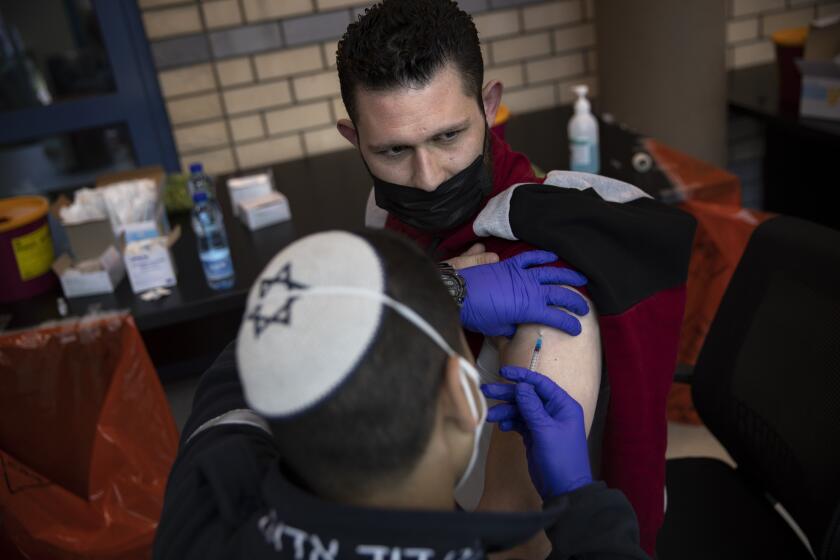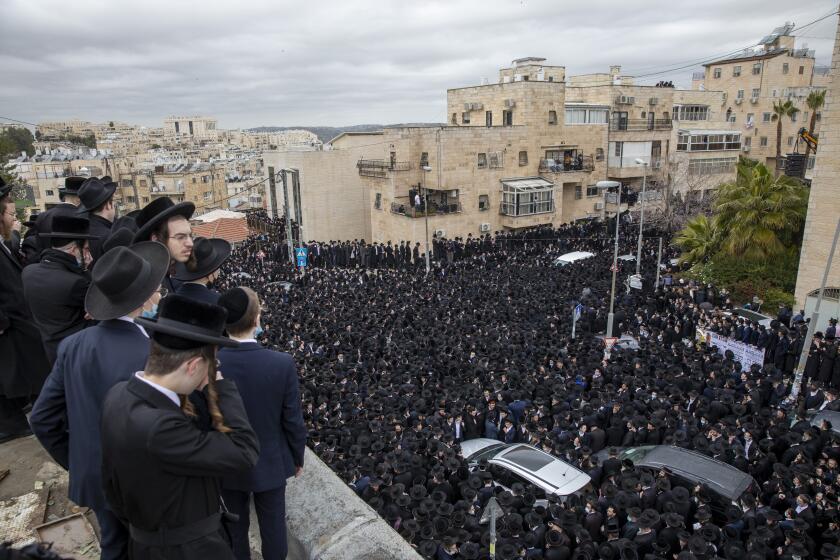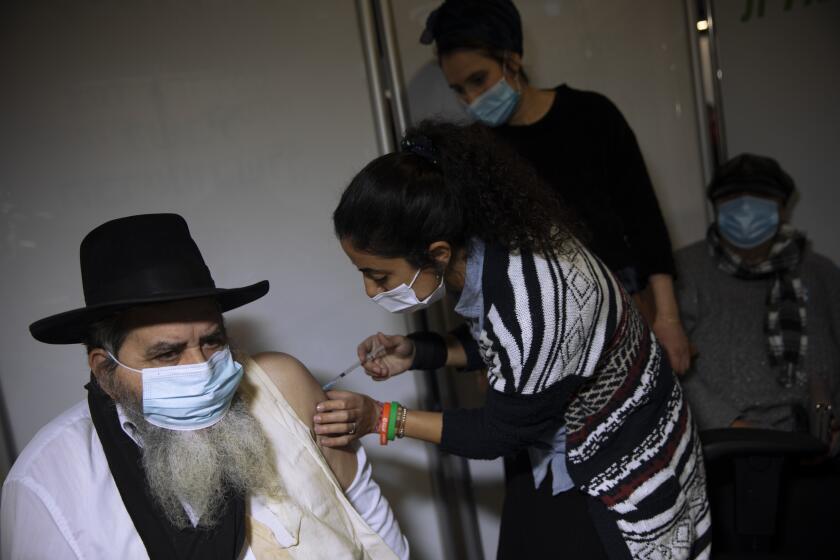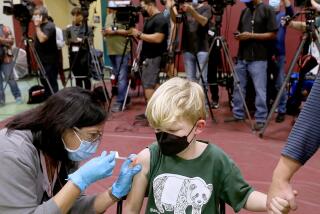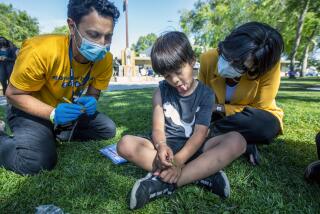Israel turns to carrots, and maybe some sticks, to persuade COVID-19 vaccine holdouts
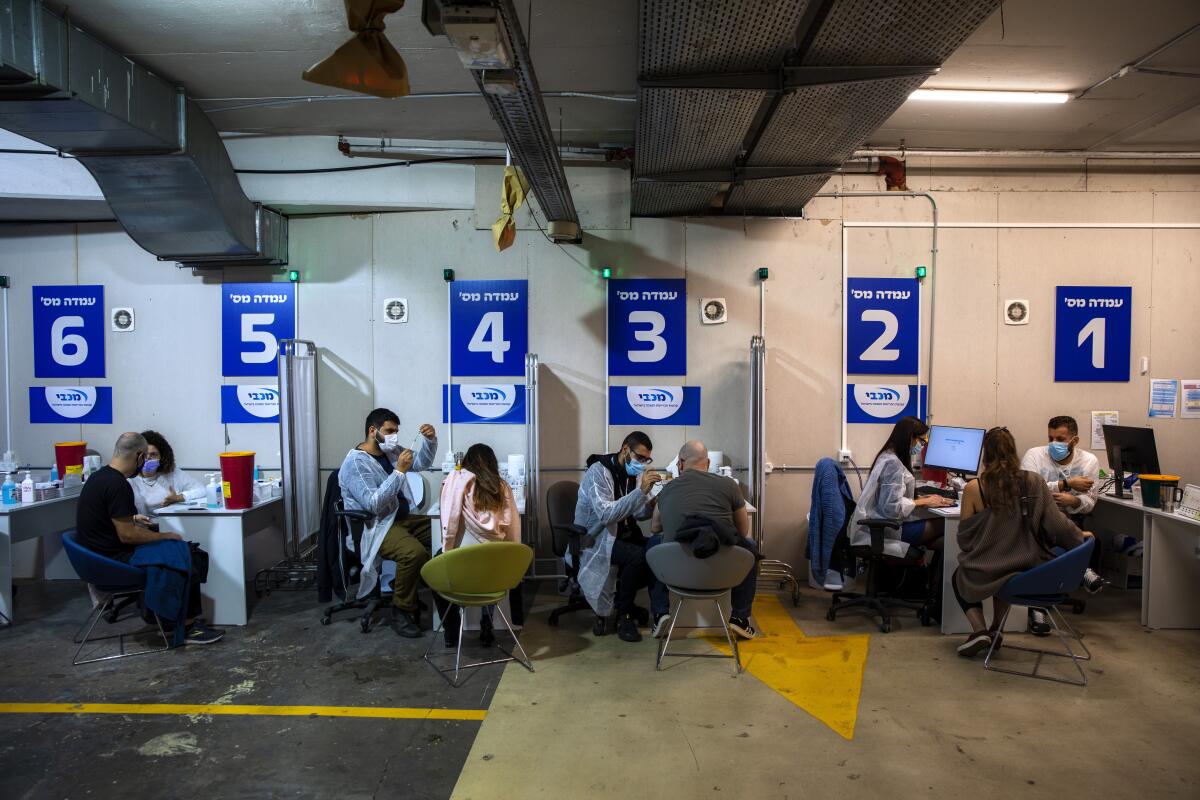
Amid pulsating techno music and the clinking of cocktail glasses, a young woman with long, dark curls sat outside a Tel Aviv bar summoning the courage to overcome her phobia of needles to get the COVID-19 vaccine.
Hila Baron, 29, flanked by a close friend on one side and a paramedic on the other, both patiently murmuring words of encouragement, finally acceded. Her first injection was complete.
“She did it!” her husband, Yotam Baron, cheered, rushing over to her as around them a stream of other young people in their 20s and 30s — the age group that has been slowest to seek vaccination in Israel — lined up to get shots at the same mobile clinic. In return, they received tickets for free drinks at the adjacent bar.
While Baron was subjected to some gentle coaxing (and maybe the promise of a free cocktail) to get herself inoculated, the Israeli government is looking at incentives and some stronger, possibly coercive measures to persuade holdouts to sign up to what has been the world’s fastest and most successful national COVID-19 vaccine rollout. Besides young people, some members of the ultra-Orthodox and Arab communities have been reluctant to get the vaccine, which is now available to anyone over 16.
Half of Israel’s population has been inoculated. The combination of official carrots and sticks to reach the rest reflects the challenges facing the country in its race toward herd immunity — and also the fact that the vaccination drive is a political as well as medical imperative. Prime Minister Benjamin Netanyahu, who is facing an election next month, has made the success of the vaccination rollout and the promise of a return to “normal life” the centerpiece of his campaign.
Citing the traditional Passover song that asks what makes the first night of the holiday, which begins March 27, different from other nights, he quipped that Israelis would be able to give a new answer: “Because we are now all vaccinated.”
A new study from Israel strongly suggests that the Pfizer-BioNTech vaccine works as well in the real world as it does in clinical trials.
To help make that happen, controversial new legislation was passed Wednesday that permits the health ministry to provide municipalities with the names, addresses and contact information of residents who have not been vaccinated. The law allows city workers to use the information to contact those people and try to convince them to do so. The measure also grants the education and welfare ministries access to that information.
Haim Katz, a member of Netanyahu’s Likud Party, said in parliament that the law was justified given the stakes. “I’ve been asked, ‘What about people’s privacy?’” Katz said. “Is privacy more important than life itself?”
But civil rights groups and privacy advocates warn that it sets a dangerous precedent of violating medical confidentiality.
“We are concerned about this not only as a violation of privacy and the medical confidentiality, but as an irreparable breach of trust between civilians and the medical establishment, and the potential for the misuse of the information at the hands of local authorities,” said Maya Fried, director of international relations for the Assn. for Civil Rights in Israel, or ACRI.
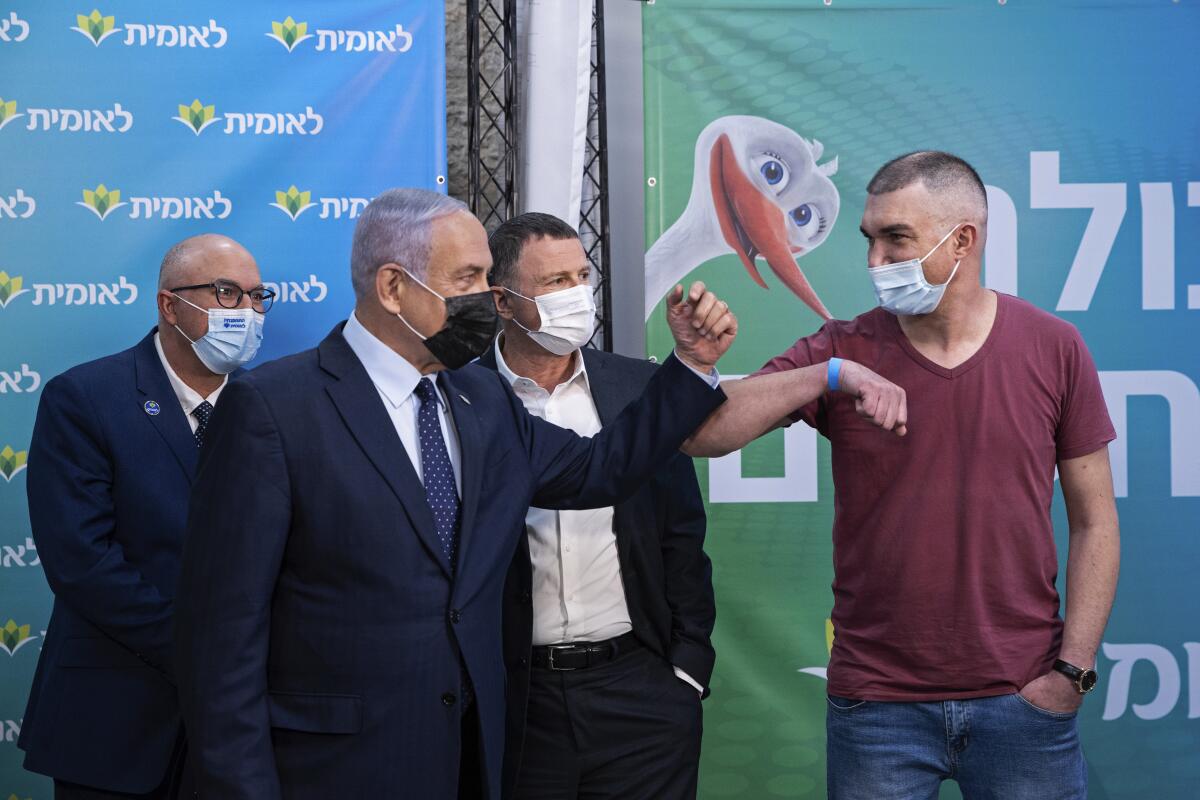
Proposals have also been floated to require unvaccinated public-sector employees, including teachers, to take a coronavirus test every two days and those who fly into the country from abroad to wear an electronic monitoring anklet to deter them from breaking quarantine.
Another bid to incentivize vaccination is the “green pass” that can be downloaded onto a smartphone a week after a person’s second COVID-19 shot or if he or she has had the disease. For now, it’s the only way to get into major soccer games, concert halls, theaters, gyms and swimming pools, and to eat in at restaurants once they reopen.
“Things are changing on a daily basis,” said Fried, whose organization is monitoring implementation of the green-pass system. “It’s not so black and white. It’s a matter of ‘wait and see’ to see what the civil rights issues will be.”
Thousands of ultra-Orthodox Israelis attended a funeral that flouted the country’s ban on large public gatherings amid the pandemic.
The efficiency and speed of Israel’s vaccination rollout has been credited to the country’s small size, its nationalized and digitized health system and its ample supply of vaccine. It is using the shots developed by Pfizer and BioNTech, and has purchased vaccines from Moderna.
The lowest rates of vaccination are among ultra-Orthodox Jews, Arab citizens and younger Israelis. Across these groups is a mix of apathy about the danger of the coronavirus, a wariness of the vaccine’s potential long-term side effects and a belief that the shots might actually be harmful or lead to infertility — misinformation that the government is working hard to scrub from social media. Compounding the reluctance among some Arab citizens and the ultra-Orthodox is their low level of trust in the government.
On Thursday, Netanyahu released a humorous video trying to woo the unconvinced. Riffing on the current carnival holiday of Purim, he addresses a vaccine skeptic dressed in a variety of costumes — a clown, a shaggy dog, an overgrown baby — and knocks down reasons not to get vaccinated, among them various conspiracy theories. He also says Israel will soon get back to normal “thanks to the millions of vaccines that we brought.”
Yair Zivan, a spokesman for the Yesh Atid opposition party, tweeted criticism of the video, saying that those hesitant to take the vaccine “won’t be convinced by being made fun of and thrown in with conspiracy theorists and internet trolls in a jokey video.”
Israel’s socialized and highly digitized healthcare system has aided rapid COVID-19 vaccine rollout. But Palestinians will have to wait.
Along with the international attention Israel is receiving for being the leader in per-capita vaccination distribution — and in turn a living lab for the vaccine’s efficacy — the government is getting pushback for its “vaccine diplomacy” choices.
It has supplied only a limited amount of vaccine to the Palestinians who live under Israeli occupation, saying their health is the responsibility of the Palestinian Authority. At the same time, the government caused a stir by announcing that it would send surplus doses to a handful of other countries, some of which have either officially recognized Jerusalem as Israel’s capital or signaled their acceptance of it, including, local media reports say, Guatemala, Honduras, Hungary and the Czech Republic.
After pushback from Benny Gantz, the defense minister, the government said late Thursday that it was suspending the decision.
Critics, including Israeli human rights groups, say Israel has a moral obligation to help vaccinate Palestinians. It was recently confirmed that the government agreed to vaccinate 100,000 Palestinians who work inside Israel. About 4.7 million Palestinians live in the occupied West Bank and in the Gaza Strip.
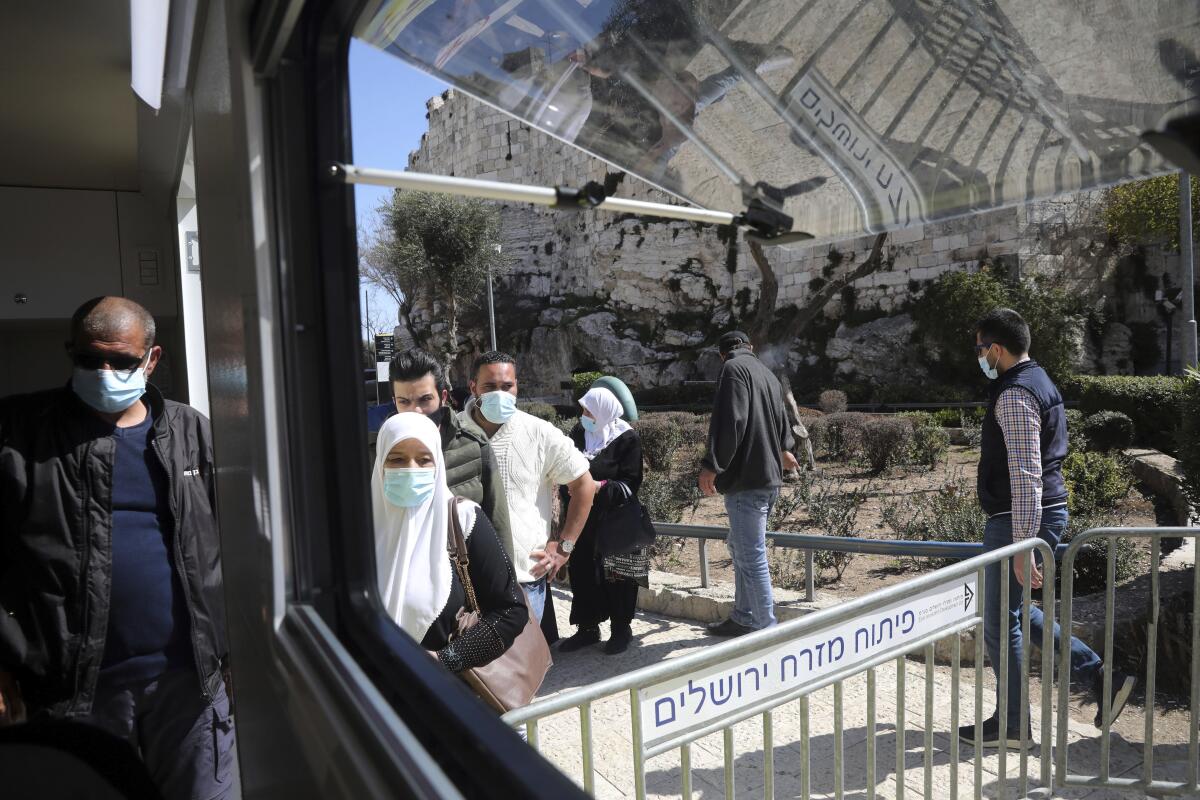
Israel even made the radar of “Saturday Night Live” when “Weekend Update” anchor Michael Che joked: “Israel is reporting that they vaccinated half of their population, and I’m going to guess it’s the Jewish half.”
The remark was assailed by some American Jewish organizations as inaccurate at best — Israel has worked to vaccinate both Jewish and Arab citizens — and anti-Semitic at worst.
On the ground here, as the number of hospitalized COVID-19 patients has dropped now that most older people have been vaccinated, there’s a common thirst for life to regain some semblance of pre-pandemic normality. This week, the first plays and concerts were available for green-pass holders to attend.
Daniel Hoffman, a violinist originally from Orange County, was thrilled to be playing for an audience again at, so far, a retirement home, a concert for medical staff and a festival for the Purim holiday.
“It was amazing for everyone,” he said. “People are starved for live music.”
More to Read
Start your day right
Sign up for Essential California for news, features and recommendations from the L.A. Times and beyond in your inbox six days a week.
You may occasionally receive promotional content from the Los Angeles Times.
